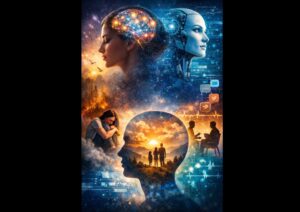5 Must-Read Sci-Fi Novels That Made the Leap to the Screen

1. Do Androids Dream of Electric Sheep? by Philip K. Dick
Adaptation: Blade Runner (1982) and Blade Runner 2049 (2017)
Philip K. Dick’s groundbreaking novel serves as the basis for the cult classic Blade Runner series. Set in a post-apocalyptic future ravaged by nuclear fallout, the story follows Rick Deckard, a bounty hunter assigned to “retire” rogue androids (or “andys”) who are nearly indistinguishable from humans.
As Deckard hunts these synthetic beings, the novel masterfully blurs the line between man and machine. The androids show emotional depth while humans appear emotionally numb. The key philosophical question at the core: What does it truly mean to be human? Dick’s dystopian vision remains hauntingly relevant today, especially as AI continues to evolve.
2. The Three-Body Problem by Liu Cixin
Adaptation: The Three-Body Problem Netflix Series (2024–present)
One of the most celebrated sci-fi novels of the 21st century, The Three-Body Problem is the first installment in Liu Cixin’s Remembrance of Earth’s Past trilogy. The narrative begins with Earth’s first contact with an alien civilization from the unstable planet Trisolaris. However, the novel moves far beyond the concept of alien life.
Liu weaves in deep philosophical questions, socio-political unrest, and scientific theories, all while exploring humanity’s response to existential threats. Netflix’s adaptation in 2024 captivated global audiences, with a second season currently in production. It’s a story of cosmic diplomacy, betrayal, and what it means to face a civilization older—and possibly wiser than ours.
3. Solaris by Stanisław Lem
Adaptation: Solaris (1972 by Andrei Tarkovsky) and Solaris (2002 by Steven Soderbergh)
A true classic in philosophical science fiction, Solaris explores the nature of consciousness and the limitations of human understanding. The plot centers on a group of scientists aboard a space station orbiting the planet Solaris, which is covered entirely by a sentient ocean. This alien entity creates physical manifestations of the crew’s innermost fears, regrets, and memories.
Rather than focusing on aliens as external threats, Solaris turns the lens inward. It questions whether we can ever truly understand another form of intelligence without first understanding ourselves. Lem’s novel, especially Tarkovsky’s adaptation, remains a seminal piece for those interested in introspective, existential sci-fi.
4. Stories of Your Life and Others by Ted Chiang
Adaptation: Arrival (2016)
Ted Chiang’s short story collection isn’t a novel in the traditional sense, but its influence on sci-fi cinema is undeniable. The story Story of Your Life, which inspired the Oscar-nominated film Arrival, is a poignant meditation on language, time, and memory.
Chiang blends complex scientific ideas with emotional narratives, making his stories deeply human. Themes range from the limits of free will to the role of belief systems in shaping reality. His work exemplifies the idea that science fiction can be as emotionally resonant as any literary fiction, while still asking the big questions.
5. Klara and the Sun by Kazuo Ishiguro
Adaptation: Upcoming film (in development, directed by Taika Waititi)
Nobel Prize-winning author Kazuo Ishiguro brings a unique, literary touch to science fiction in Klara and the Sun. The story is told from the perspective of Klara, an Artificial Friend waiting in a store to be chosen. When she’s finally selected to care for a sick teenage girl, Klara demonstrates a profound capacity for empathy, curiosity, and love.
As AI becomes a bigger part of our lives, Klara and the Sun forces us to ask: Can machines truly love? And if they can, does it matter whether that love is real or artificial? The upcoming film adaptation by Taika Waititi is already generating buzz as a potential modern classic in emotional sci-fi.
Conclusion: Where Fiction Meets Future
These five stories exemplify why science fiction continues to captivate readers and viewers alike. More than just tales of technology and space, these narratives ask deeply human questions—about identity, memory, morality, and existence. As more of these masterpieces are adapted for the screen, their impact only deepens, reminding us that the future may be imagined, but the questions it raises are real.




